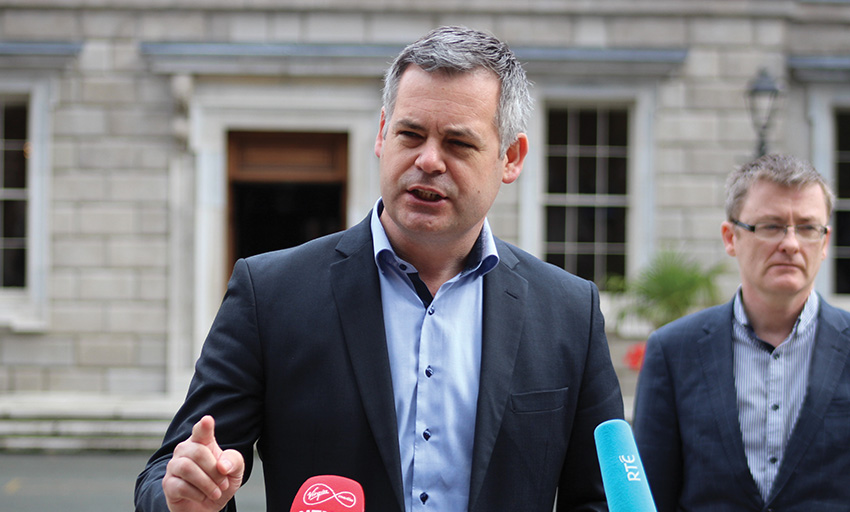Housing challenges persist for Government

Having initially claimed that the Department of Housing, Local Government and Heritage had “blown its target out of the water” when CSO figures suggested construction targets had been exceeded in 2022, Minister Darragh O’Brien TD will have to contend with figures from the National Building Control Office suggesting that the CSO overestimated housing completions by around 6,000 in 2022.
Having held onto his job during the December 2022 cabinet reshuffle, Minister for Housing, Local Government and Heritage Darragh O’Brien TD has proclaimed that his department had “turned the corner”.
This was in reaction to figures released by the CSO, which stated that 29,851 homes were fully built in 2022, a figure above the Government’s initial target of 24,600 and representing a 45 per cent increase in homes completed compared with 2021.
However, data released by the National Building Control Office states that there were only 23,751 which, if true, would mean that rather than blowing their target “out of the water” as Minister O’Brien has claimed, that the Government has missed its target for housing completions.
The Government has critiqued the methodology of National Building Office Control statistics, stating that since it only measures back to March 2014 that it cannot take account of homes constructed before then.
Housebuilding
Housing for All was launched in 2021, with its first full year of implementation covering 2022. Although Minister O’Brien will be satisfied at the level of dwelling completions for Q4 2022, which represented a 31.5 per cent increase on construction figures compared with Q4 2021, one challenge is that the number of new dwellings that commenced construction in the previous 12 months was just under 27,000 a 12.3 per cent drop on the previous year.
Reflecting on the CSO figures in 2022, Minister O’Brien stated, prior to the National Building Office statistics being released: “It has been a really strong start for Housing for All; we have blown our target out of the water. We will not be complacent though. We know there is a long way to go.”
Social housing completions
The Department for Social Protection, led by Minister Heather Humphries TD, has indicated that around 6,500 social houses were built in 2022. Minister O’Brien, however, has stated that this figure is “frankly incorrect”, and that “we will be much closer to 8,000 new-build social homes than what was attributed”.
However, The Irish Times revealed a report leaked from The Housing Commission which claims that 62,000 homes must be constructed annually to simply meet current demand.
Speaking in the Dáil on 26 January 2023, Sinn Féin’s Pearse Doherty TD commented on the report and claimed that the Government’s targets in Housing for All, even if met, will lead to a housing shortfall of 245,000 by 2030.
Homelessness and quality of housing
Although Minister O’Brien has claimed success on house completions in 2022, homelessness has continued to reach successive record levels in the State.
The CSO recorded that as of December 2022, there were 11,632 homeless people in the State, which represents a new record and a 30 per cent increase when compared with the figure from December 2021.
Sinn Féin housing spokesperson Eoin Ó Broin TD described the homelessness figures as “disturbing” and called on the Government to extend the temporary winter eviction ban.
“This is the first time homelessness has risen in December for some time. The fact that it has happened while the winter ban on evictions is in place is deeply disturbing.”
Minister O’Brien stated that the ongoing eviction ban, which is due to expire on 1 April 2023, was “under review” and that the homelessness figures are “too high” and that it is “a really difficult situation”.

Criticism has been articulated in relation to the number of derelict homes in the State, which have the potential to house Ireland’s homeless population more than 10 times over.
Speaking on RTÉ on 29 January 2023, Independent TD Denis Naughten stated: “We are crying out for population in the west and northwest and yet we have 45,000 vacant homes there today that need to be opened up to deal with the pressure and housing demand that’s there at the moment.”
The following day, Minister O’Brien announced the Vacant Homes Action Plan 2023-2026, in which the Department of Housing states that it will allocate €2 billion to tackle homelessness in the State.
Within this, there will be a new fund of €150 million to be allocated to local authorities with the aim of regenerating vacant and derelict housing.
This followed an announcement of a legacy defects scheme; a fund of €2.5 billion which will be spent on between 62,500 and 100,000 houses, mostly built through the Celtic Tiger era, which suffer from building defects such as mica.
2023
The CSO figures were being presented as a major victory for the Government, thereby emphasising the potential embarrassment at the National Building Control Office data, as the Government continues to grapple with the worst housing crisis in the State for generations.
Furthermore, the reduction in the number of homes which commenced building in December 2022 is an ominous portent for 2023, suggesting that there may be a decline in housebuilding in the future. This is compounded by record homeless figures amid significant government expenditure required to rebuild defective homes and bring vacant homes back into supply.
Further challenges lay in ensuring an adequate workforce to continue building houses on such a scale, with the Department of Further and Higher Education, Research, Innovation and Science’s report, Report on the Analysis of Skills for Residential Construction and Retrofitting, 2023 to 2030 stating that, in order to meet targets in Housing for All, that 24,186 new workers must be recruited for construction roles, with a further 22,779 construction workers required to meet national retrofitting targets.





